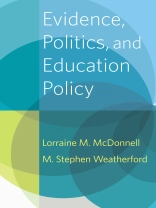In Evidence, Politics, and Education Policy, political scientists Lorraine M. Mc Donnell and M. Stephen Weatherford provide an original analysis of evidence use in education policymaking to help scholars and advocates shape policy more effectively. The book shows how multiple types of evidence are combined as elected officials and their staffs work with researchers, advocates, policy entrepreneurs, and intermediary organizations to develop, create, and implement education policies.
Evidence, Politics, and Education Policy offers an in-depth understanding of the political environment in which evidence is solicited and used. Two key case studies inform the book’s findings. The primary case—a major, multimethod study—examines the development and early implementation of the Common Core State Standards at the national level and in four states: California, Indiana, Massachusetts, and Tennessee. A comparative case analyzes the evidence used in Congressional hearings over the twenty-year history of the Children’s Health Insurance Program. Together, the two cases illustrate the conditions under which different types of evidence are used and, in particular, how federalism, the complexity of the policy problem, and the policy’s maturity shape evidence use.
Mc Donnell and Weatherford focus on three leverage points for strengthening the use of research evidence in education policy: integrating research findings with value-based policy ideas; designing policies with incentives for research use built into their rules and organizational structures; and training policy analysts to promote the use of research in policymaking venues.
عن المؤلف
Lorraine M. Mc Donnell is a professor emerita of political science at the University of California, Santa Barbara. Prior to coming to UCSB, she was a senior political scientist at RAND. Her research focuses on the politics of elementary and secondary education policies and their institutional effects. In recent studies, she has examined the politics of student standards and testing, particularly their historical role in federal policy and the policy feedback they generate among political interest groups, and has used them as a lens for understanding the role of research and other evidence in policy decisions. Her publications have focused on a range of topics, including teacher unions, the education of immigrant students, and the role of citizen deliberation. She served for seven years on the National Research Council’s Board on Testing and Assessment, and was a member of the NRC’s Advisory Committee for the Division of the Behavioral and Social Sciences and Education. She is a past president of the American Educational Research Association and a member of the National Academy of Education.
M. Stephen Weatherford is a professor emeritus of political science at the University of California, Santa Barbara, a former associate dean of social science and chair of the political science department. His research has been supported by the National Science Foundation and private foundations, and has ranged over questions of representation, political trust, political economy and the politics of education policy. His writings have focused on presidential leadership in economic policy, the way presidents’ economic understanding set the agenda, and how presidents have drawn on research and policy ideas in seeking to persuade Congress and the public to support their national goals. On education, his research has investigated the school desegregation controversies of 1970s and 1980s, how parents and local activists have sought to employ deliberative processes to influence the governance of public K–12 education, and the way formal research and other evidence is integrated into the educational policy process.












